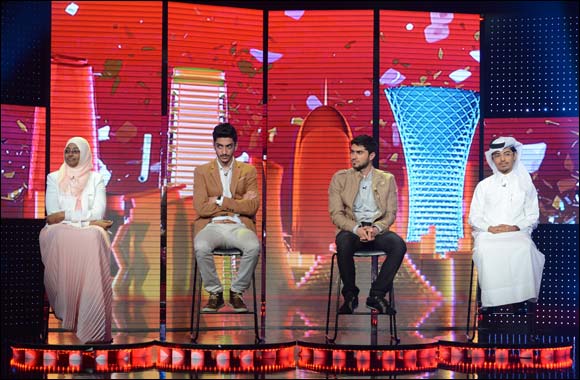
Doha, 12 October 2014: Stars of Science Season 6, broadcast on MBC4, has premiered the first of three pressure-filled elimination episodes in which the young innovators faced the scrutiny of the jury in defense of their prototypes. In this fifth episode, viewers witnessed Mohammed Al Housani of Qatar and Khaled Alsulaim of Saudi Arabia advance to the Design stage after lively discussion and much deliberation. Though their projects showed great potential, Weam Mohammed of Sudan and Johnny Khalil of Lebanon were unable to convince the jury to keep them in the competition. Stars of Science, initiated by Qatar Foundation, is the first pan-Arab reality TV program dedicated to scientific innovation. The concept of the show is to find and empower the next generation of Arab innovators through a competition in which candidates develop a novel project from concept to a potential product. Over the first five seasons, a total of 28,000 Arabs around the region were inspired to submit their inventions to Stars of Science. While projects such as Khaled AlSulaim’s Phone-to-Phone Charger, Mohammed Al Housani’s Efficient Solar Energy System and Johnny Khalil’s Active Rugby Scrum Machine were geared towards improving the performance of already existing technology, Weam Mohammed’s Non-Invasive Malaria Tester was a new product with the potential to greatly change the status quo in the health sector. The experts examining the candidates and their projects included perennial jurors Mr. Youssif Abdulrahman Al-Salhi, General Manager of Qatar Shell Research and Technology Center and Dr. Fouad Mrad, Executive Director of the United Nations ESCWA regional technology center. For the engineering stage, Stars of Science welcomed new VIP jury member Mr. Suneet Singh Tuli, who as founder and CEO of DataWind Ltd invented an affordable tablet computer to increase access to computing and the internet. The three members of the jury proved very demanding, quizzing Weam about her Non-Invasive Malaria Tester’s accuracy and casting into doubt the marketability of Johnny’s Active Rugby Scrum Machine. The jury pressed Mohammed as to how he could improve his Efficient Solar Energy System if given more time on Stars of Science and raised questions about the practicality of Khaled’s Phone-to-Phone Battery Charger. Weam Mohammed’s idea for a Non-Invasive Malaria Tester attracted huge interest from jury member Mr. Suneet Singh Tuli because of the potential of the project, if successful, to improve the diagnosis of the disease in order to save lives. Mr. Tuli, moved by Weam’s inventiveness and resolve, expressed his interest in aiding her in her efforts to improve her project. When the final results were announced it was the strength of Mohammed and Khaled’s prototypes that convinced the jury to advance them into the next phase. Mohammed came in first in a resounding win, garnering 93 of 100 points, while Khaled’s 71.5 points earned him second place. Ultimately, the testing results of both Johnny and Weam’s projects proved to be their greatest weakness and the reason for their elimination. The judging criteria were based on the performance of each candidate’s prototype performance (40 points), the product’s outlook (40 points), and the resourcefulness and leadership shown by the candidate (20 points). “Arab youth can innovate and create breakthroughs today as easily as anybody else anywhere in the world if they are willing to dream big enough and pursue those dreams,” said Mr. Tuli. “I believe that Stars of Science will create a cultural shift by providing support and motivation to young innovators. This in turn will contribute to the development and growth of the Arab world as a whole.” On the next Stars of Science episode, to be shown on 18th October 2014 at 8:00 PM KSA time on MBC4, viewers will see four more candidates put their prototypes to the test in an effort to progress to the next stage. For more information please visit:
Website - www.starsofscience.com
Facebook - https://www.facebook.com/StarsofScienceTV
Twitter - https://twitter.com/starsofscience
Youtube- http://www.youtube.com/user/Starsofsciencetv
Instagram- starsofsciencetv Stars of Science
Stars of Science is an original TV format, initiated by Qatar Foundation, which encourages the Arab world’s aspiring science and technology innovators. In this sixth season, 12 candidates are challenged to prove their resourcefulness during critical stages of the innovation cycle with an expert panel of academic jurors and industry leaders. Eliminations take place in Engineering and Design episodes until only four projects remain. These four finalists vie for a share of a $600,000 prize, determined by a jury deliberation and voting from the public. The program airs from Saturday, September 13th to Saturday, November 15th 2014 on MBC4 Qatar Foundation - Unlocking Human Potential
Qatar Foundation for Education, Science, and Community Development (QF) is a private, non-profit organisation that is supporting Qatar on its journey from a carbon economy to knowledge economy by unlocking human potential, for the benefit of not only Qatar, but the world. Founded in 1995 by His Highness Sheikh Hamad bin Khalifa Al Thani, the Father Emir, QF is chaired by Her Highness Sheikha Moza bint Nasser. QF’s work encompasses education, research and community development. World-class universities are brought to Qatar to help create an education sector in which young people can develop the attitudes and skills required for a knowledge economy. At the same time, QF builds Qatar's innovation and technology capacity by developing and commercializing solutions through key sciences. The Foundation also works to foster a progressive society while enhancing cultural life, protecting Qatar’s heritage and addressing immediate social needs in the community. For a complete list of QF’s initiatives and projects, visit http://www.qf.org.qa
|